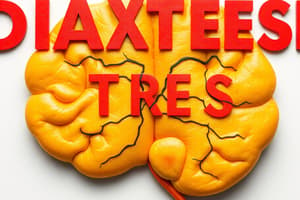Podcast
Questions and Answers
Marie’s experience in the lunchroom is an example of _____
Marie’s experience in the lunchroom is an example of _____
- Socialization (correct)
- Anticipatory socialization
- Resocialization
- The looking glass self
Erik Erikson's theory explains:
Erik Erikson's theory explains:
- Why Rhesus Monkeys preferred terry cloth maternal stand-ins versus the maternal stand-ins that provided food.
- How human sexual desire is linked to the development of a personality.
- When human moral development begins in an individual.
- How the actions of society help shape personalities throughout the eight basic stages of life. (correct)
Which of the following is an example of socializing a child into a gender role?
Which of the following is an example of socializing a child into a gender role?
- Buying Sarah a toy kitchen to play with. (correct)
- Taking Jimmy to the aquarium.
- Allowing Joey to sleep with his 'blankey.'
- Letting Kim wear pants to school.
According to Kohlberg's theory of moral development, when do humans begin to think about the feelings of other people?
According to Kohlberg's theory of moral development, when do humans begin to think about the feelings of other people?
George Herbert Mead's specific path of development for individuals is as follows:
George Herbert Mead's specific path of development for individuals is as follows:
Which stage of development are Katrina and Sharon exemplifying by playing together?
Which stage of development are Katrina and Sharon exemplifying by playing together?
One of the most influential impacts of Émile Durkheim's study of suicide was:
One of the most influential impacts of Émile Durkheim's study of suicide was:
What are Jimmy's teacher and father arguing about?
What are Jimmy's teacher and father arguing about?
Parents often socialize their children to:
Parents often socialize their children to:
Education is important to society because:
Education is important to society because:
Study Notes
Socialization and Development Theories
- Socialization is the process through which individuals learn and internalize the norms and values of their society.
- Erik Erikson's theory outlines eight stages of human development where societal interactions shape personality formation.
- Gender roles are often established during childhood through socialization, exemplified by purchasing gender-specific toys (e.g., a toy kitchen for girls).
- Kohlberg's theory suggests that moral reasoning develops significantly during teenage years, with the ability to empathize with others.
- George Herbert Mead identifies a sequence in child development: preparatory stage, play stage, game stage, and the realization of the generalized other.
Stages of Development
- Mead's stages:
- Preparatory stage: Children mimic significant others, lacking understanding of social roles.
- Play stage: Children engage in role-play, imagining themselves in various roles.
- Game stage: Children understand and anticipate the roles of others in group dynamics.
- Generalized other: Awareness of societal expectations, norms, and behaviors.
Influence of Sociology
- Émile Durkheim's suicide study distinguished sociology from psychology, emphasizing societal influences over individual psychological factors.
- The debate of nature versus nurture highlights the influence of genetics versus environment in shaping behavior, illustrated in the case of Jimmy's disruptive behavior.
Parental Influence on Socialization
- Parents typically socialize children to mirror their own norms and values to ensure continuity in cultural practices.
- Education plays a crucial role in society by providing knowledge, facilitating interactions, and teaching ways to respond to authority and social situations.
Overview of Education's Role
- Education equips children with facts about the world, social skills for peer interactions, and behavioral norms for various situations.
Studying That Suits You
Use AI to generate personalized quizzes and flashcards to suit your learning preferences.
Description
Explore the various theories of socialization and human development, including Erikson's stages of development and Mead's concepts. This quiz delves into how societal interactions shape personality and moral reasoning from childhood through adolescence.




